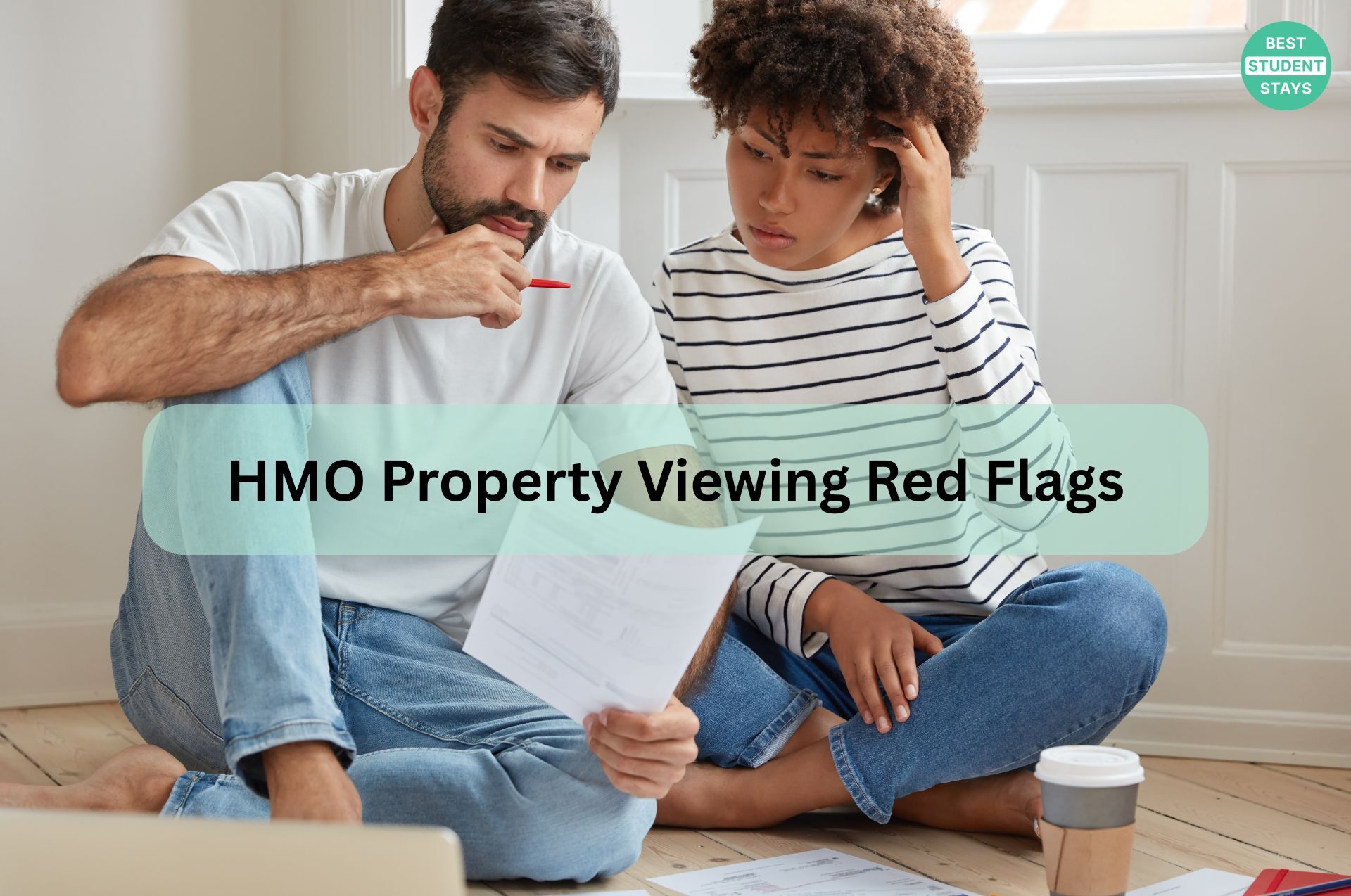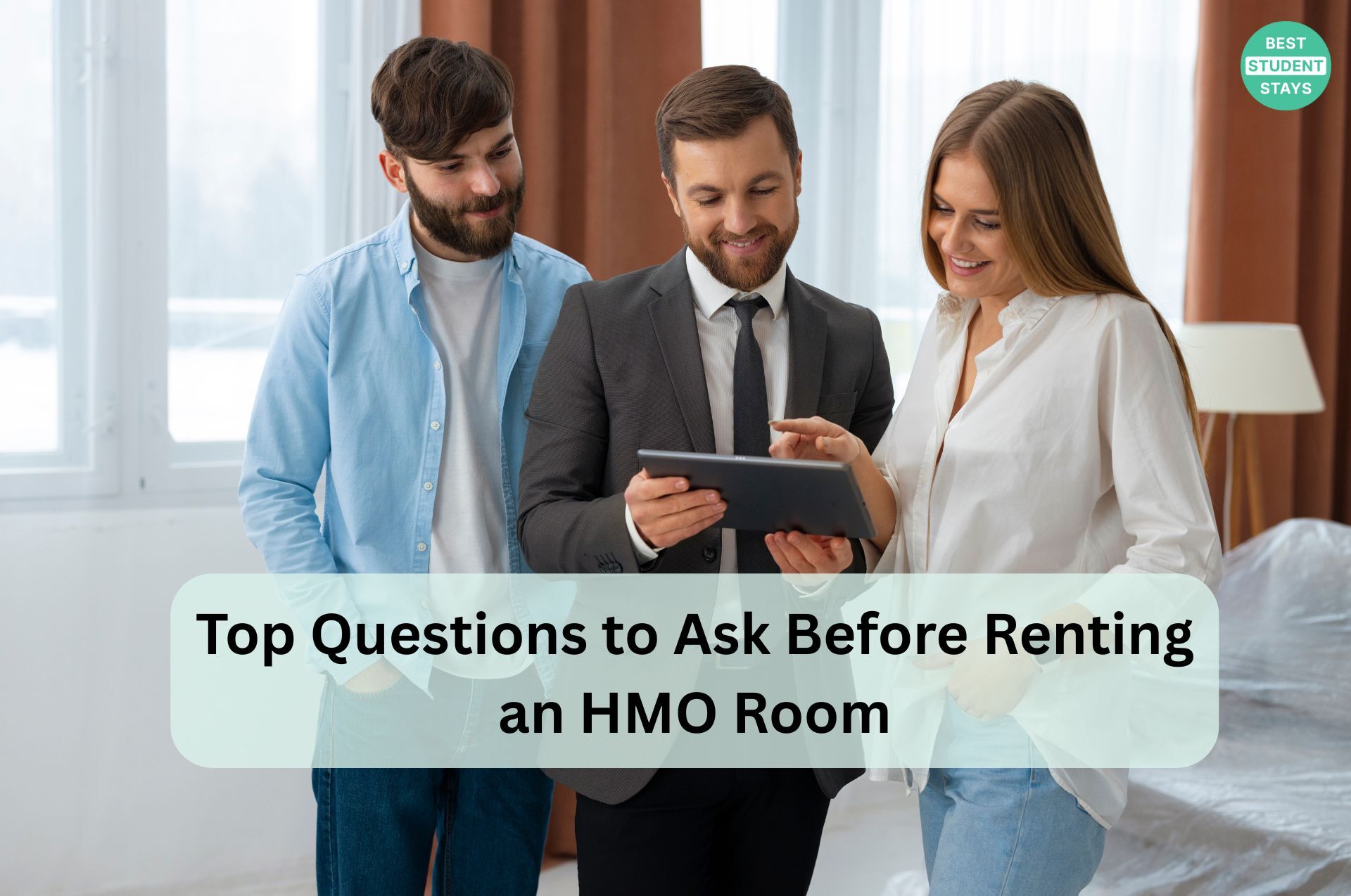Picture this: You're frantically searching for student accommodation. Deadlines are looming. Everyone else seems to have sorted their housing months ago. You're competing with hundreds of other students for decent places.
Sound familiar?
Here's what happened to my friend Sarah last year. She rushed into viewing a "perfect" student house near campus. The rent seemed reasonable. The location was ideal. She signed on the spot.
Three weeks later? Mold covered her bedroom walls. The boiler broke constantly. The landlord ignored her calls. She ended up moving out and losing her deposit.
Don't be Sarah.
I've seen too many students make costly mistakes because they didn't know what warning signs to spot. That's why I'm sharing these five red flags that could save you months of stress and hundreds of pounds.
Understanding HMO Properties First
Let's start with basics. An HMO means House in Multiple Occupation. It's any property where three or more unrelated people share kitchens and bathrooms. Most student houses are HMOs.
Why does this matter?
HMOs have stricter rules than regular rentals. Properties with five or more tenants need special licenses. Landlords must meet specific safety standards. Councils can step in when things go wrong.
But here's the problem. Many landlords don't follow these rules. Some don't even know them. That's where knowing these red flags becomes your protection.
Red Flag #1: Missing or Dodgy HMO Licensing
You ask to see the HMO license. The landlord gets shifty. They make excuses. They claim they don't need one.
Run.
Here's the deal. Any HMO with five or more people needs a council license. No exceptions. Many areas require licenses for smaller HMOs too. Cities like Nottingham license all shared houses.
What you should check:
Ask to see the license certificate straight up. It should show the property address, maximum occupancy, and expiry date. Most councils publish online registers where you can check licenses yourself.
Watch out for these responses:
-
"We're applying for the license" (They should already have it)
-
"This isn't technically an HMO" (It probably is if you're sharing facilities)
-
"The license is at our office" (Should be displayed at the property)
-
Refusing to give license details
I know a student group in Manchester who discovered their "licensed" place was actually unlicensed. They reported maintenance issues to the council. The landlord got prosecuted. The students got six months of rent back through a Rent Repayment Order.
Your move: Check your local council's HMO register before viewing. No license listed? Ask why. If the explanation sounds dodgy, walk away.
Red Flag #2: The Place Looks Like a Disaster Zone
You walk in and immediately notice problems. Paint peeling everywhere. Windows that won't open. Strange smells. Missing smoke alarms.
These aren't just cosmetic issues. In HMOs, maintenance problems often mean safety problems.
Your safety checklist:
|
What to Check |
Red Flag Alert |
|
Fire alarms |
Missing, damaged, or dead batteries |
|
Fire safety |
No fire doors, blocked exits, no extinguisher |
|
Electrical |
Overloaded outlets, exposed wiring, no certificates |
|
Gas safety |
No certificate, dodgy boiler |
|
Water |
Poor pressure, leaks everywhere, no heating |
Damp and mold warning signs:
-
Musty smells that hit you when you walk in
-
Black spots on walls, especially near windows
-
Wallpaper peeling off
-
Condensation on windows
I learned this the hard way. My first student house had a "small" damp patch in the corner. By Christmas, it covered half the wall. My clothes got moldy. My asthma got worse. The landlord blamed us for "not ventilating properly."
Pest problems to spot:
-
Mouse droppings (little black specks)
-
Holes in walls or skirting boards
-
Pest control traps lying around
-
Strange scratching sounds
Your move: Take photos of any problems during viewing. Ask when they'll be fixed. Get it in writing before signing anything.
Red Flag #3: Sketchy Landlords and Letting Agents
The person showing you around seems unprofessional. They rush you through. They dodge your questions. They pressure you to decide immediately.
Trust your gut on this one.
Classic manipulation tactics:
The pressure play: "We need a decision today. Three other groups are interested." Real landlords give you time to think. Good properties don't need high-pressure sales.
The question dodger: They can't answer basic stuff about bills, deposits, or house rules. They promise to "find out later" about important details.
Money grabbers: Asking for deposits before viewing. Demanding cash payments. Pushing "holding fees" on the spot.
No tenant contact: Won't let you speak with current tenants. Claims "they're all out" every time you visit.
Professional red flags:
-
No proper office address
-
Using personal emails (@gmail, @hotmail)
-
Can't show proper ID
-
Not registered with deposit protection schemes
-
No insurance details
Dodgy conversation examples:
❌ "The deposit protection? We handle that ourselves."
✅ Should be: "We use [specific scheme name] for deposit protection."
❌ "Bills? That varies month to month."
✅ Should be: "All bills included" or clear breakdown.
❌ "House rules? You'll work it out yourselves."
✅ Should be: Written house rules and clear policies.
Your move: If something feels off, it probably is. Professional landlords answer questions clearly and give you time to decide.
Red Flag #4: Fishy Money Matters
The financial terms seem weird. The rent is way below market rate. There are loads of hidden fees. They want cash only.
Here's reality: Student accommodation typically costs £150-200 per week in most UK cities. This should include rent, utilities, and internet. Anything way below market rate usually has catches.
Money red flags:
|
Warning Sign |
What It Really Means |
Hidden Cost |
|
"Bills included but..." |
Usage caps, extra charges |
£30-50+ monthly |
|
No deposit protection |
Your money isn't legally protected |
Risk losing everything |
|
Cash only |
No paper trail |
No legal protection |
|
Massive upfront fees |
Admin, cleaning, inventory fees |
£200-500 extra |
The international student trap:
International students often face extra demands:
-
Multiple months rent upfront
-
UK guarantors (even when not needed)
-
Excessive "admin fees" for visa checks
-
Higher deposits "because of visa status"
Most of this is unnecessary. Companies like Best Student Stays understand visa requirements properly and offer fair terms.
Deposit protection facts:
Your deposit must be protected in a government scheme within 30 days. You should get paperwork confirming which scheme holds your money. This is law, not optional.
Your move: Calculate total move-in costs before viewing. Get written breakdown of all fees. Never pay cash or to personal accounts.
Red Flag #5: Living Standards That Won't Work
The space looks tiny. There's one fridge for eight people. The bathroom is disgusting. You can hear everything through paper-thin walls.
UK law requires minimum room sizes: 6.52 square meters for one person, 10.23 for couples. But legal minimums aren't always livable minimums.
Room assessment reality check:
Too cramped: Can't fit a desk and open the wardrobe simultaneously? Can't move around comfortably? It's too small.
No natural light: Basement rooms or tiny windows affect mental health. Some councils ban basement bedrooms in HMOs.
Paper walls: If you hear normal conversation during viewing, you'll hear everything at night.
Shared facility problems:
|
Facility |
What You Need |
Red Flag |
|
Kitchen |
One fridge per 5 people, cooking space |
One tiny fridge for 6+ people |
|
Bathroom |
One toilet per 5 people |
Shared toilet for 8+ people |
|
Internet |
Reliable broadband |
No wifi or super slow speeds |
|
Storage |
Proper wardrobe space |
Nowhere for your stuff |
Privacy and security issues:
-
No locks on bedroom doors
-
Broken front door security
-
Easy access from outside
-
No house rules about guests or noise
The social factor:
HMO living works when there's respect and clear boundaries. Warning signs:
-
Current tenants seem stressed or unhappy
-
Obvious conflicts between housemates
-
No system for sharing responsibilities
-
Landlord says "sort problems out yourselves"
Your move: Count facilities and divide by planned occupancy. Ask about house rules. Trust your gut about living there comfortably.
Your Viewing Game Plan
Before you go:
-
Check council HMO register
-
Research local market rates
-
Prepare key questions
-
Bring a friend for backup opinion
During the viewing:
-
Take photos of everything
-
Test water pressure, heating, wifi
-
Ask for licenses and certificates
-
Talk to current tenants if possible
-
Check all safety stuff
After the viewing:
-
Compare with other places
-
Verify any claims made
-
Get important answers in writing
-
Sleep on the decision
Quick scoring system:
Rate each property out of 5:
-
Legal stuff (licensing, safety certificates)
-
Physical condition (maintenance, cleanliness)
-
Professional management (communication, responsiveness)
-
Fair money terms (transparent pricing, proper deposits)
-
Livable standards (space, facilities, privacy)
Anything scoring below 3 in multiple areas needs serious thought.
When You Spot Red Flags
Don't panic, but don't ignore them either.
Immediate deal-breakers:
-
No HMO license when required
-
Serious safety issues
-
Dodgy financial demands
-
Aggressive or unprofessional behavior
Potentially fixable:
-
Minor maintenance problems
-
Missing paperwork (if provided quickly)
-
Unclear house rules (if clarified in writing)
Your negotiating power:
Good tenants are valuable. Responsible landlords want reliable students who pay on time and look after properties. You have more power than you think.
Use red flags as talking points:
-
"We love the place, but these maintenance issues need fixing first"
-
"The room's perfect, but we need bills arrangement in writing"
-
"Can you provide safety certificates and license details today?"
Finding Better Options
Seeing too many red flags? Try these alternatives:
Trusted platforms: Use student accommodation sites like Best Student Stays that verify properties and provide extra protection.
University services: Many unis maintain approved landlord lists with higher standards.
Student unions: Often have advice services and recommended accommodation providers.
Word of mouth: Current students give honest reviews of landlords and properties.
Bottom Line
Student housing hunting doesn't have to be a nightmare. These five red flags help you spot problems before they become your problems.
Remember:
-
Good HMO landlords want to show their compliance
-
Professional agents answer questions clearly
-
Decent properties don't need pressure tactics
-
Your safety matters more than any specific property
Take your time. Ask the right questions. Trust your instincts.
The housing market is competitive, but don't let time pressure force you into a place that fails basic standards. Your uni experience should be supported by safe, comfortable accommodation—not ruined by housing problems you could have avoided.
Every red flag you spot now is a problem you won't have to live with later. Use this guide as your checklist and stay confident in your search.
There are good HMO properties and professional landlords out there. You just need to know how to find them.
Ready for verified student accommodation that ticks all these boxes? Check out quality HMO properties at Best Student Stays, where listings are verified for licensing, safety, and fair pricing.



